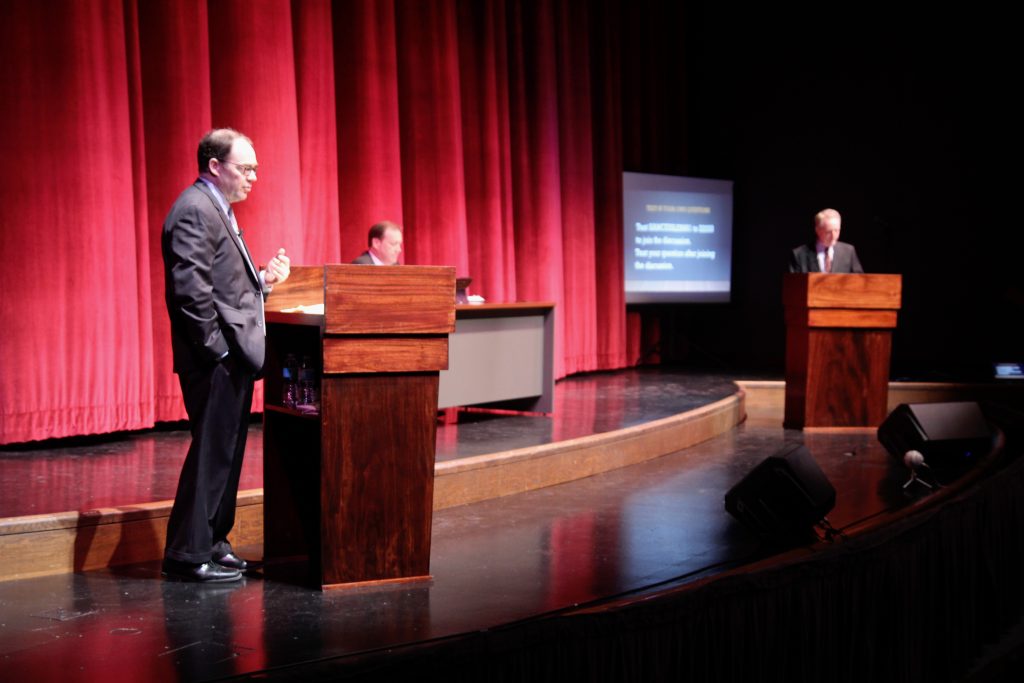
Immigration has become a hot topic across the country, and the conversation reached Binghamton University on March 19 when experts on immigration squared off for the third installment of the “You Defend It” debate series.
The event was hosted in the Anderson Center’s Chamber Hall by the Binghamton University Speech and Debate Team, along with Defend It Inc., a local debate organization. The opposing sides were Ira Mehlman, media director of the Federation for American Immigration Reform, who seeks to reduce immigration levels, and Craig Nichols, a partner at Nichols Law Offices, PLLC in Syracuse, who specializes in litigation on behalf of immigrants. Questions were asked by Rob Kilmer, the founder of Defend It Inc. and the event’s moderator.
Each participant addressed multiple topics including questions on the purpose of immigration laws, caps on the number of immigrants entering the United States and whether new immigration laws need to be implemented.
In response to a question focusing on the intent behind immigration laws, Mehlman claimed that the U.S. immigration policy is there to serve the interest of the American people, although it currently does not. This, he argued, is the result of differing priorities among the American people.
“When it comes to immigration policy, we haven’t even determined what the public-interest objective is,” Mehlman said. “As a result, we have this hodgepodge of laws that were created to serve one special interest or another. We should select people who come to this country based on some objective assessment of their likelihood to succeed and contribute to this country, and then have rational policies in place that are enforceable so that when people do break the law, we can have some course of action in place.”
Nichols responded that there are a variety of components to consider when determining who to let into the country.
“[Immigrants] come to this country looking for opportunities for themselves and their children, for a chance to make something more of themselves,” Nichols said. “When we have people immigrate to this country, that’s when we have people who bring new ideas, new drive, determination and more variety.”
Addressing annual immigration levels, Mehlman proposed that the United States reduce the cap. He argued that the current system of bringing in immigrants based on which of their family members live in the United States is inefficient and ignores more objectively important criteria.
“We need [to] get away from the family chain migration and make the system fairer for everyone so that people, regardless of where they come from and whether or not they have family in the U.S., have an opportunity to be at least considered for immigration into the U.S.,” Mehlman said.
Nichols responded by agreeing that immigration limits are a complex issue. He said that if a limit is not imposed, an increasing number of people immigrating could cause an unbalance in the country’s infrastructure.
His views on illegal immigration were less defined.
“For persons who are illegally present, there needs to be bipartisan recognition that this is a complicated subject, and figure out a solution especially for people who have been here for 15 to 20 years and have nowhere to go back home to,” Nichols said. “We shouldn’t give them amnesty, but at the same time, we shouldn’t treat them with vilification as this current administration has. We need to find a better way, but I don’t know the answer to it.”
Ian Brill, a junior majoring in English, said he attended the event to gain further insight on immigration, especially considering that many people base their beliefs about the issue on fear.
“Watching the news more and more, I think it’s important to learn why immigrants are coming here and to learn the stances individuals take in regards to these immigrants, whether it is out of xenophobia and fear, or if they actually have factual evidence as to why immigrants would be bad for our country,” Brill said. “A lot of people make decisions based on fear without having a logical assessment of the situation and I’d like to be able to shed some light on the subject.”
The next event in the “You Defend It” debate series is scheduled in the month of April and will be about the repeal and replacement of the Patient Protection and Affordable Care Act.


